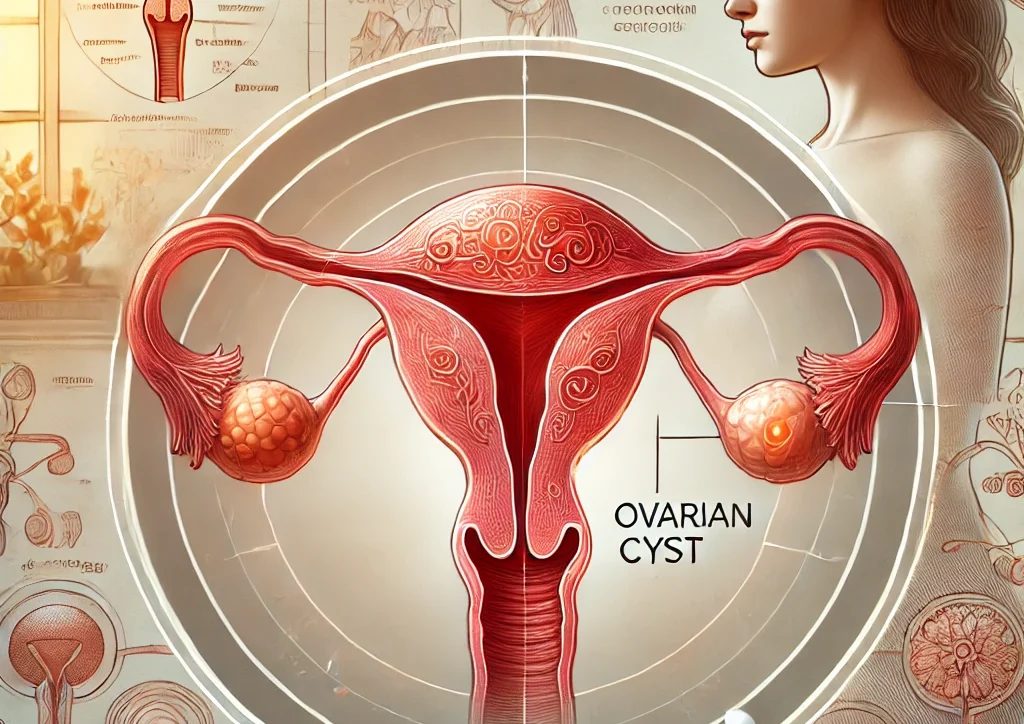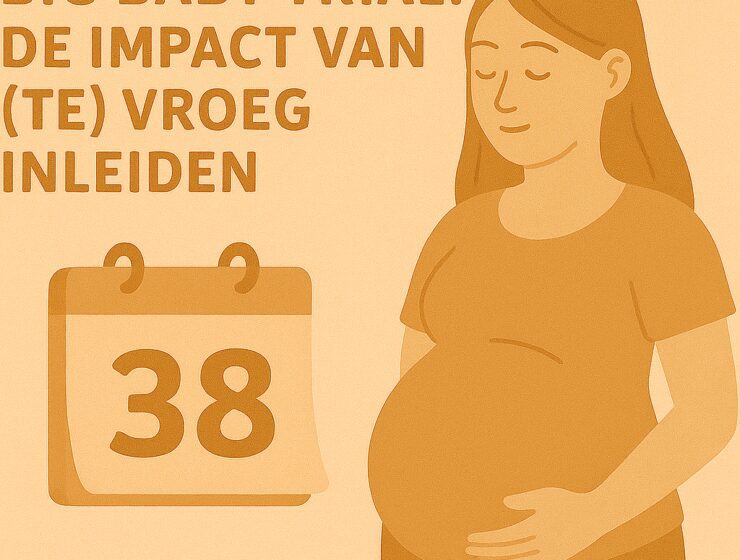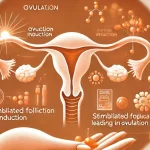Being pregnant is an exciting and special time, full of expectations and emotions. Of course you want everything to go as smoothly as possible. But what if you discover a cyst during your pregnancy? Do not panic! In this article we explain in an understandable and accessible way what exactly a cyst is, what the possible causes are and what you can do to keep both yourself and your baby healthy.
Ovarian cyst
When you are pregnant, concerns about your health can easily arise. So it is not surprising if you are concerned about a cyst. Fortunately, most cysts are benign and do not pose a direct threat to the pregnancy. However, it is wise to keep a number of things in mind. hold. Anorexia is often caused by hormonal changes andthe size can vary. Always consult your doctor or midwife for an appropriate approach and treatment. We are here to support and advise you throughout your pregnancy journey.
There are different types of cysts that you may encounter during your pregnancy, such as:
-
- Functional cysts
-
- Dermoid cysts
-
- Endometrioma
It is important to know that it often disappears on its own without medical intervention. However, if the cyst causes pain, becomes larger or causes complications, your obstetrician may recommend an ultrasound. Together with a specialist we will then determine the best next steps, so that your well-being and that of your baby are central. The table below provides a brief overview of symptoms you may experience and what you can do:
| Symptom | Action |
|---|---|
| Mild abdominal pain | Contact your midwife |
| Sudden, severe pain | Visit a doctor immediately |
| Irregular bleeding | Consult your midwife |
Cyst during pregnancy
During pregnancy, a cyst can cause concern. Cysts during pregnancy are usually benign and harmless. Nevertheless, it is wise to keep an eye on any symptoms. They often disappear on their own after the first few months. Some signs to look out for are:
-
- Pain in the lower abdomen
-
- Bloated feeling
-
- Irregular bleeding
So do you feel anything unusual about your body? Don't hesitate to contact us!
What you can do is mainly listening to your own body and discussing your concerns with your midwife. If the cyst persists or if symptoms worsen, an ultrasound may be necessary to examine it further. In some cases it may even be useful to draw up a treatment plan. Yet most women are not bothered by their cysts during pregnancy and can continue with their pregnancy without any problems.
Bee Midwives Lelystad we are always ready to advise and support you.
Is a cyst dangerous during pregnancy?
A cyst during pregnancy can cause a lot of anxiety for expectant mothers. However, in most cases you don't have to worry. Cysts, which are fluid-filled sacs, are common and usually harmless. Yet it is important to know when to contact your midwife. There are certain situations in which a cyst can pose risks, such as when it grows quickly or when you experience severe pain.
There are some symptoms and situations that you should pay extra attention to:
-
- Severe abdominal cramps: This may indicate a burst or twisted cyst.
-
- Unusual blood loss: Although light bleeding is common, unexpected heavy bleeding should be checked.
-
- Pelvic pain: Persistent pain in the lower abdomen or pelvis should always be reported to your midwife.
To help you further, Midwives Lelystad has drawn up some recommendations for you:
| Situation | Action |
|---|---|
| Cyst < 5 cm without symptoms | Regular check-up |
| Cyst > 5 cm or with symptoms | Consult with specialist |
| Severe pain or bleeding | Contact us immediately |
Stay calm and trust your GP or midwife. They are ready to guide you and ensure that your pregnancy runs as smoothly as possible, despite the presence of a cyst. Ultimately, we want you and your baby to be healthy and happy!
Can you get pregnant with a cyst?
At Midwives Lelystad we are often asked whether it is possible to become pregnant with a cyst. YesThat's certainly possible! Many women have ovarian cysts without being bothered by them. Moreover, there are various types of cysts, such as functional cysts, dermoid cysts and endometriomas. Most cysts are benign and hardly affect your fertility. Yet it is always a good idea to have a cyst checked by your doctor or gynecologist. These professionals can perform an ultrasound to determine the nature and size of the cyst.
However, in some cases a cyst can causecomplications. For example, a large cyst can put pressure on surrounding organs, causing discomfort. Furthermore, certain types of cysts, such as endometriosis, affect fertility. So it's important to keep track of your symptoms and discuss them with your healthcare provider.
Here are some symptoms to keep an eye on:
-
- Irregular menstruation
-
- Abdominal pain or bloating
-
- Pelvic pain
In addition, the table below shows when you should seek immediate medical attention:
| Symptom | Action |
|---|---|
| Severe, sudden pain | Contact your doctor immediately |
| Loss of consciousness | Call 112 immediately |
| Fever with pain | Call your doctor for an emergency appointment |
Is an ovarian cyst dangerous?
Ovarian cysts are common and usually not dangerous. These fluid-filled sacs often appear during the menstrual cycle and often disappear on their own. However, if you are pregnant, you want to make sure that your cyst will not cause any complications. Fortunately, most cysts are harmless and should not be a concern. Nevertheless, it's important to know when a cyst requires attention to keep you and your baby safe.
Most cysts do not cause any complaints. However, if a cyst causes symptoms such as abdominal pain, bloating or irregular bleeding, you will want to make an appointment with your midwife. At Midwives Lelystad we ensure that you are checked quickly and thoroughly. In some cases, a cyst can twist or rupture, requiring medical attention. So, don't hesitate to get in touch if you have any concerns.
| Cyst Type | Symptoms |
|---|---|
| Functional cysts | Usually none, sometimes abdominal pain |
| Dermoid cysts | Rare symptoms, cosmetic concerns |
| Endometrial cysts | Chronic pelvic pain |
Miscarriage due to cyst on ovary
How do you get rid of an ovarian cyst?
To get rid of an ovarian cyst, there are several treatment options available. First, it's important to know that not all cysts require treatment. They often disappear on their own within a few weeks or months. However, if you experience complaints, there are medical treatments that can help. For example, your doctor may prescribe hormonal treatment to stop the growth of the cyst. In addition, painkillers help to relieve any discomfort, so you feel better during your pregnancy.
If the cyst persists or becomes larger, surgery may be an option. There are two possible interventions:
-
- Laparoscopy: a minimally invasive procedure in which the cyst is removed through small incisions.
-
- Laparotomy: a larger abdominal operation that may be necessary for complex or large cysts.
Because you are pregnant, your doctor will carefully consider which treatment is safest for you and your baby. In any case, it remains important to consult your midwife regularly and discuss any concerns you may have.
How big can an ovarian cyst be?
When you're pregnant and have an ovarian cyst, it can sound quite scary. Fortunately, most cysts do not need to be a cause for panic. Usually, ovarian cysts are benign and do not cause any symptoms or damage to your pregnancy. Still, it's good to know what size they can grow to so you're prepared.
-
- Ovarian cysts vary widely in size; some are only a few millimeters in size, while others can grow up to 10 centimeters.
-
- Functional cysts: These mainly occur during the menstrual cycle and are usually smaller than 5 cm.
-
- Dermoid cysts: These can grow larger, sometimes even more than 10 cm, but generally do not pose a threat to the pregnancy.
| Cyst type | Average size | Risks |
|---|---|---|
| Functional | <5 cm | Little to no risks |
| Dermoid | 5 – 12 cm | Can cause pain |
Although some cysts can grow large, this rarely leads to complications. However, if you notice that you have severe abdominal pain or other symptoms such as dizziness, it is important to contact your obstetrician immediately. At Midwives Lelystad we are always there for you and can treat you or refer you to further investigation if necessary. This means you are always in safe hands.
How long should you not have sex after cyst removal?
After the removal of a cyst during your pregnancy, it is important to give your body time to recover. Doctors usually recommend waiting between 3 and 4 weeks before being sexually active again. This may seem like a long time, but it gives your body the chance to fully heal. In addition, the scar tissue can recover well, which avoids complications. Naturally, the recovery time varies per person, so listen carefully to your own body and always consult with your treating doctor or midwife.
There are several factors that can influence the recovery time. For example, think of:
-
- Where the cyst was located
-
- The size of the cyst
-
- How drastic the operation was
-
- Any additional complications
To promote recovery, you can pay attention to a number of things. For example, avoid strenuous physical exertion or lifting heavy objects. It is also advisable to get enough rest and follow a healthy, balanced diet. By doing so, you give yourself the best chance of a quick and problem-free recovery.
Conclusion
And there you have it, everything you need to know if you're pregnant and have a cyst! Being pregnant can bring enough uncertainties, and a cyst may sound like the last thing you want. Hopefully we have been able to reassure you with this information and you now know what to expect and do.
At Midwives Lelystad we are always ready to guide you through every phase of your pregnancy. Do you have any questions or concerns? Don't hesitate to contact us. We are here to support you and work with you to ensure a worry-free pregnancy.
Continue to take good care of yourself and always listen to your body; After all, you are most at home in your own skin.
Midwives Lelystad








